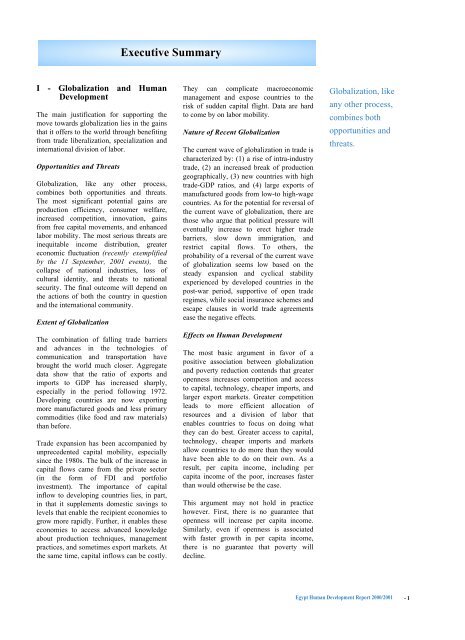English - Human Development Reports - United Nations ...
English - Human Development Reports - United Nations ...
English - Human Development Reports - United Nations ...
You also want an ePaper? Increase the reach of your titles
YUMPU automatically turns print PDFs into web optimized ePapers that Google loves.
Executive SummaryI - Globalization and <strong>Human</strong><strong>Development</strong>The main justification for supporting themove towards globalization lies in the gainsthat it offers to the world through benefitingfrom trade liberalization, specialization andinternational division of labor.Opportunities and ThreatsGlobalization, like any other process,combines both opportunities and threats.The most significant potential gains areproduction efficiency, consumer welfare,increased competition, innovation, gainsfrom free capital movements, and enhancedlabor mobility. The most serious threats areinequitable income distribution, greatereconomic fluctuation (recently exemplifiedby the 11 September, 2001 events), thecollapse of national industries, loss ofcultural identity, and threats to nationalsecurity. The final outcome will depend onthe actions of both the country in questionand the international community.Extent of GlobalizationThe combination of falling trade barriersand advances in the technologies ofcommunication and transportation havebrought the world much closer. Aggregatedata show that the ratio of exports andimports to GDP has increased sharply,especially in the period following 1972.Developing countries are now exportingmore manufactured goods and less primarycommodities (like food and raw materials)than before.Trade expansion has been accompanied byunprecedented capital mobility, especiallysince the 1980s. The bulk of the increase incapital flows came from the private sector(in the form of FDI and portfolioinvestment). The importance of capitalinflow to developing countries lies, in part,in that it supplements domestic savings tolevels that enable the recipient economies togrow more rapidly. Further, it enables theseeconomies to access advanced knowledgeabout production techniques, managementpractices, and sometimes export markets. Atthe same time, capital inflows can be costly.They can complicate macroeconomicmanagement and expose countries to therisk of sudden capital flight. Data are hardto come by on labor mobility.Nature of Recent GlobalizationThe current wave of globalization in trade ischaracterized by: (1) a rise of intra-industrytrade, (2) an increased break of productiongeographically, (3) new countries with hightrade-GDP ratios, and (4) large exports ofmanufactured goods from low-to high-wagecountries. As for the potential for reversal ofthe current wave of globalization, there arethose who argue that political pressure willeventually increase to erect higher tradebarriers, slow down immigration, andrestrict capital flows. To others, theprobability of a reversal of the current waveof globalization seems low based on thesteady expansion and cyclical stabilityexperienced by developed countries in thepost-war period, supportive of open traderegimes, while social insurance schemes andescape clauses in world trade agreementsease the negative effects.Effects on <strong>Human</strong> <strong>Development</strong>The most basic argument in favor of apositive association between globalizationand poverty reduction contends that greateropenness increases competition and accessto capital, technology, cheaper imports, andlarger export markets. Greater competitionleads to more efficient allocation ofresources and a division of labor thatenables countries to focus on doing whatthey can do best. Greater access to capital,technology, cheaper imports and marketsallow countries to do more than they wouldhave been able to do on their own. As aresult, per capita income, including percapita income of the poor, increases fasterthan would otherwise be the case.This argument may not hold in practicehowever. First, there is no guarantee thatopenness will increase per capita income.Similarly, even if openness is associatedwith faster growth in per capita income,there is no guarantee that poverty willdecline.Globalization, likeany other process,combines bothopportunities andthreats.Egypt <strong>Human</strong> <strong>Development</strong> Report 2000/2001 - 1
















